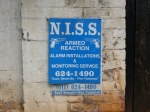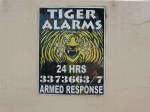South Africa is the second country in the world for its usage of barbed wire after Israel. That’s information that you can pick up in the tourist guides. But when you see every house, building, shopping mall, business surrounded by high walls, electric wires and barbed wires you realise that this is more than just a side issue. Guards are at the entrance of most buildings, signs on every property threaten of armed response.
The problem is not just petty theft, it is violent crime. We heard some horrific stories.
What this does to the country is difficult to comprehend. Going out at night is simply dangerous. In one of the the first backpackers we stayed at we asked where we could have dinner and they said that they preferred if their guests didn’t go out at night and we had to order a pizza.
Many people are prisoners in their own homes as soon as soon as the sun goes down.
In other countries I know that some areas are dangerous because crime ridden. Here it is all over the big towns.
Why is this the case? Many African countries have known periods of high violence. But in South Africa it is a daily issue which has been going on for years.
I have been wondering if it is not closely linked to the conflicts which have riddled South Africa since the Anglo-Boer war. I happen to have read a book on this period and really want to share my thoughts and newly acquired knowledge.
Between 1899 and 1902 a « white war » broke out between the British in the South of the country and the Boers to the North. It was a new war in many senses. Weaponry favoured the defenders with smokeless rifles. The Boers invented the trenched warfare where their shooting wouldn’t give up their position. But when they were nevertheless overwhelmed by the sheer number of British troops, the Boers had a dilemma:
By the beginning of 1900 the conventional war was over, the Boers had lost their major towns, the war prisoners they had taken had been freed and president Kruger was in exile. If they accepted any peace treaty offered by the British they would have lost a war which was totally unjust (the British had been pulled into the war by the political manoeuvring of Sir Milner and they tried to take away the political independence of the Boers with hardly any justifiable cause), on the other hand if they rejected surrender and continued the war they had no more base or men to continue a normal war. They would revert to guerilla tactics and rely on the civilians to provide them food and shelter. Small groups of Boers would send raiding parties to destroy railway lines, attack British camps at night, catch convoys. This was a new type of warfare. Not a war which was fought by armies alone but a war in which civilian populations would be involved. Rather than just concede defeat, as in any normal war up to then, the Boers decided to go for a guerilla war.
Now for the British they were already at war and to finish it they had to answer to the guerilla tactics, cut the supply lines and hunt down a tiny army in a huge country. The second part of the war was to become very messy. Farms were burnt to the ground and cattle slaughtered to avoid guerilla warriors to find food and shelter. Women and children were parked in camps to avoid them being left to die in the veld. The organisation of the camps was not a top priority for Kitchener in charge of the British operations, so famine and disease killed thousands of women and children in the camps (only after more than a year, and international public outcry, were the camps made more humane with death rates falling even below average death rates of similar populations). Even in the latest part of the war the British stopped bringing children and women to the camps, to burden further the Boer soldiers. In the end by sheer exhaustion the Boer generals negotiated peace terms which put an end to this war. But the worm was in the fruit. The country had lived through a war where no rules were respected, every action was justified by the end. The guerillas who had justice on their side committed hideous crimes and the British retaliated logically but brutally.
The irony of the situation is that a few years latter the leaders of the Boer camp became prime ministers of the nation which emerged from that conflict. Namely Jan Smuts and Louis Botha. And they planted the seeds for apartheid laws by splitting the land 93% for the Whites and 7% for the Blacks.
Years later, the Blacks under the apartheid regime, reacted like the Boers had, by guerilla warfare against the power in place. They too, as they had justice on their side, considered that any tactics were allowed. Today the Apartheid Museum in Johannesburg, apart from showing the real injustice of Apartheid, is an apology to revolution and violence.
Now today there is still rampant injustice throughout South Africa. Poverty is widespread, the political promises made by the ANC after the Apartheid years have failed to materialise, corruption is believed to be everywhere, Justice is being subjugated to political pressures (Zuma, the president-to-be, is tied up in arms dealing and corruption charges and the political parties are trying to avoid charges being pressed and Justice investigating). This situation can explain why the poor, or anybody who feels that he is in an unjust situation, believe that they do not need to abide by the law any more. Like the Boers before them or the Blacks during Apartheid, do they believe that the end justifies the means. Not necessarily as a people but on an individual basis where they can bring justice to themselves. The violence experienced in South Africa could be an new form of guerilla tactics on an individual basis. This could help explain the high levels of violence and crime and hence the insecurity which South Africa must live with.
Filed under: Afrique du Sud | Tagged: Insecurity, South Africa | Leave a comment »







